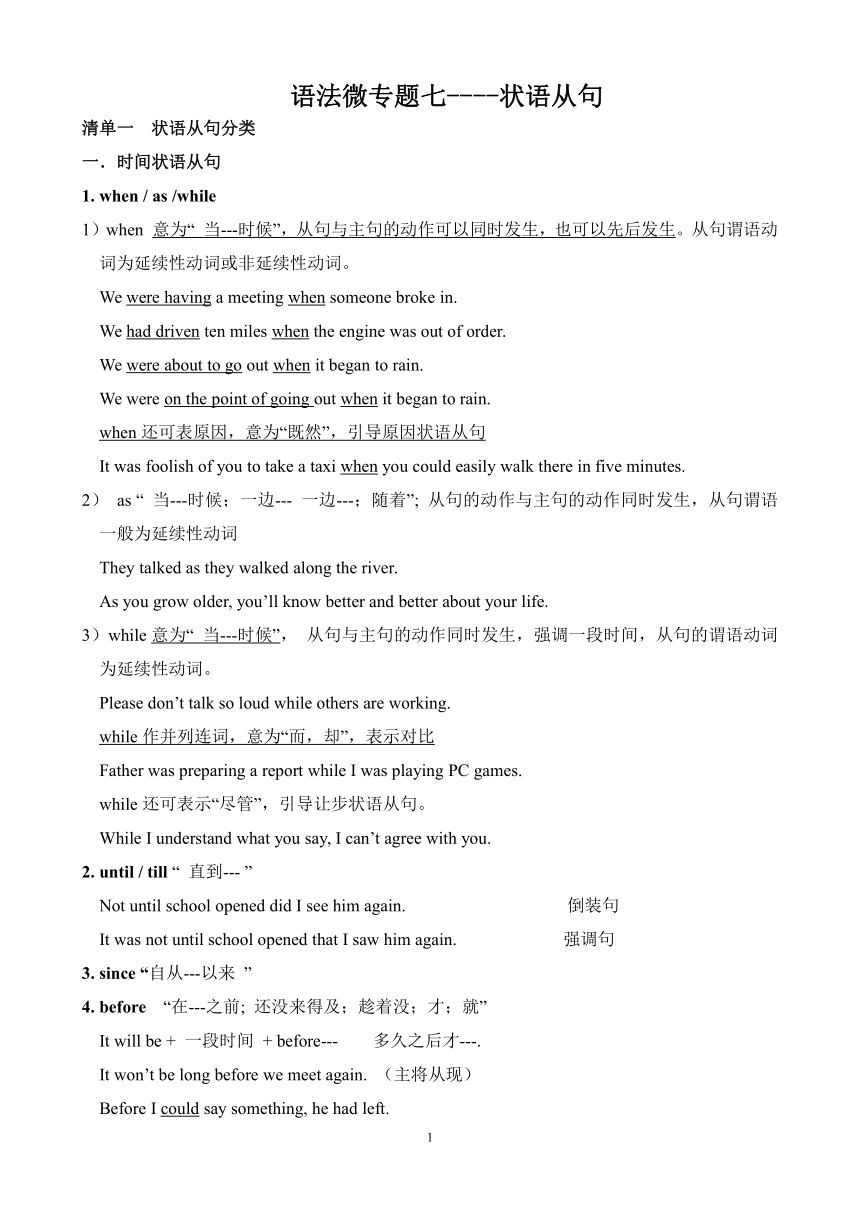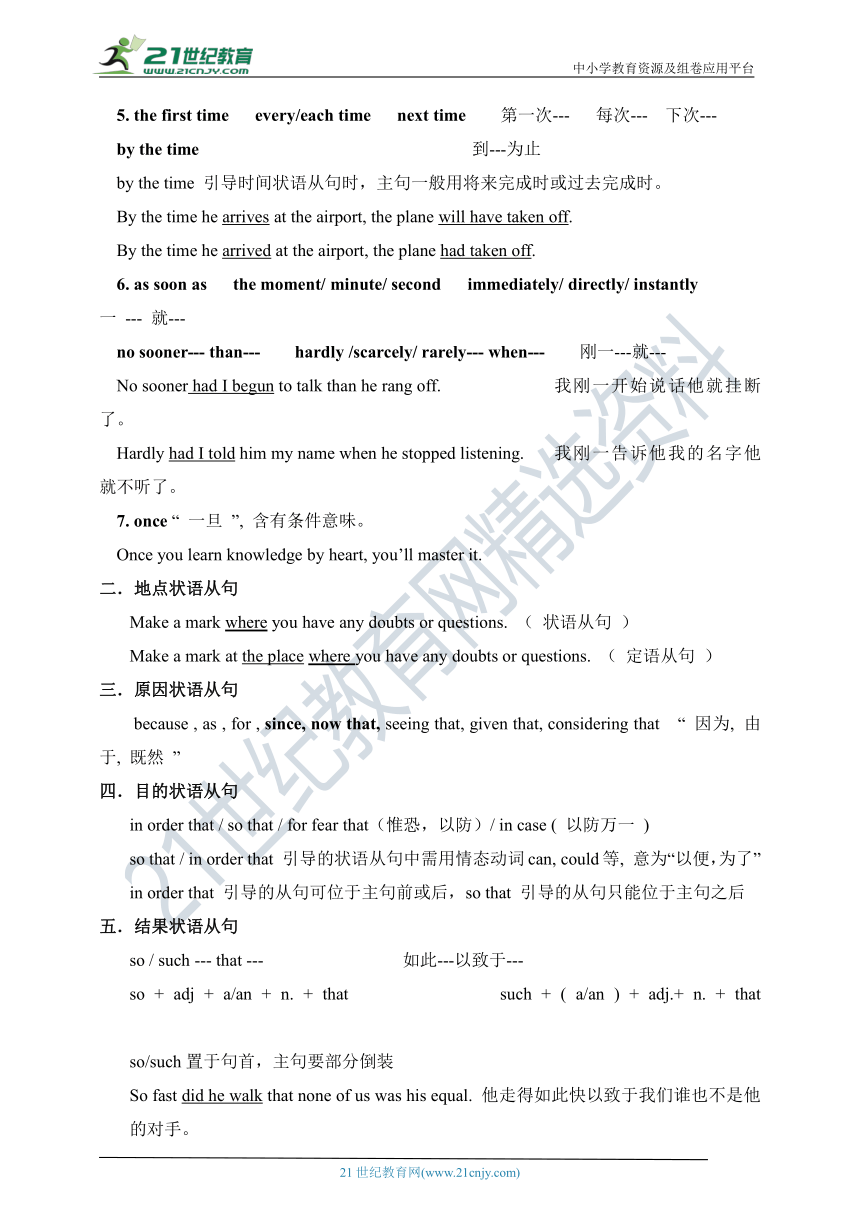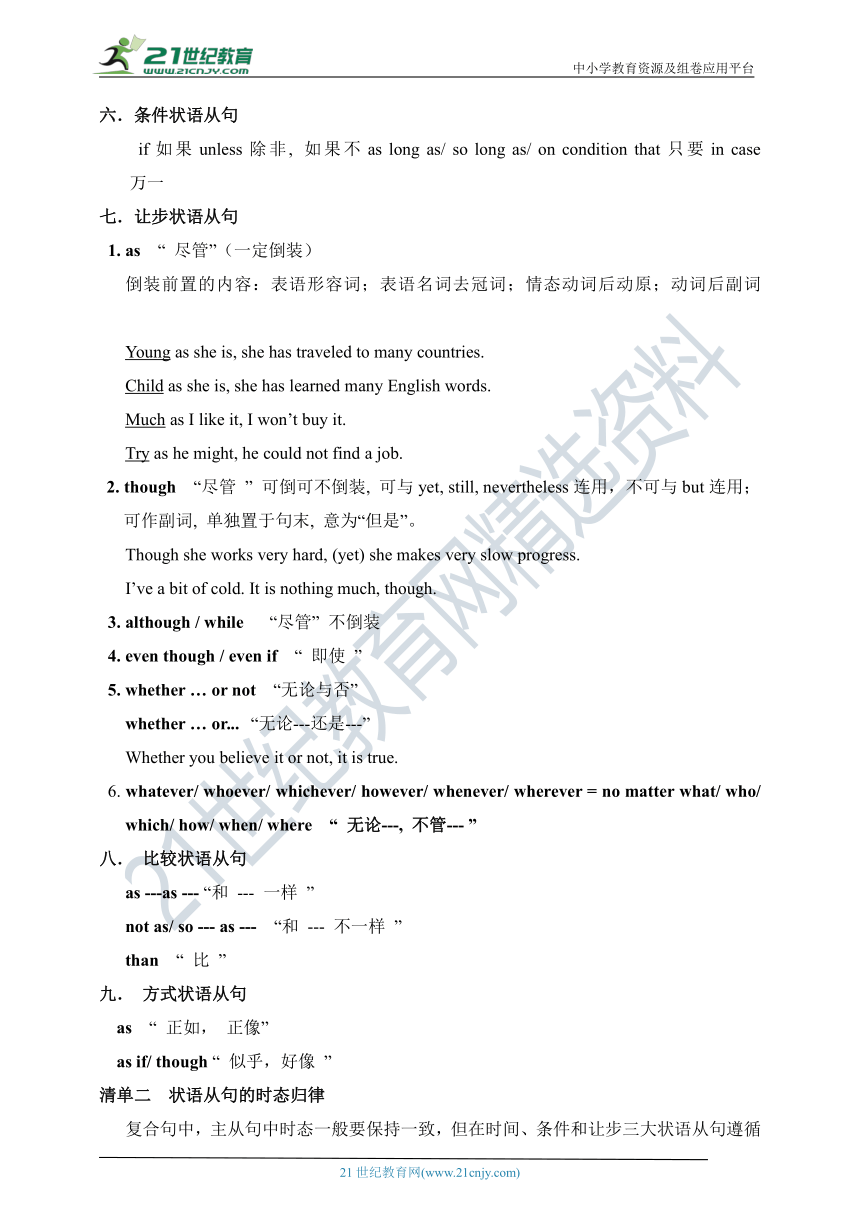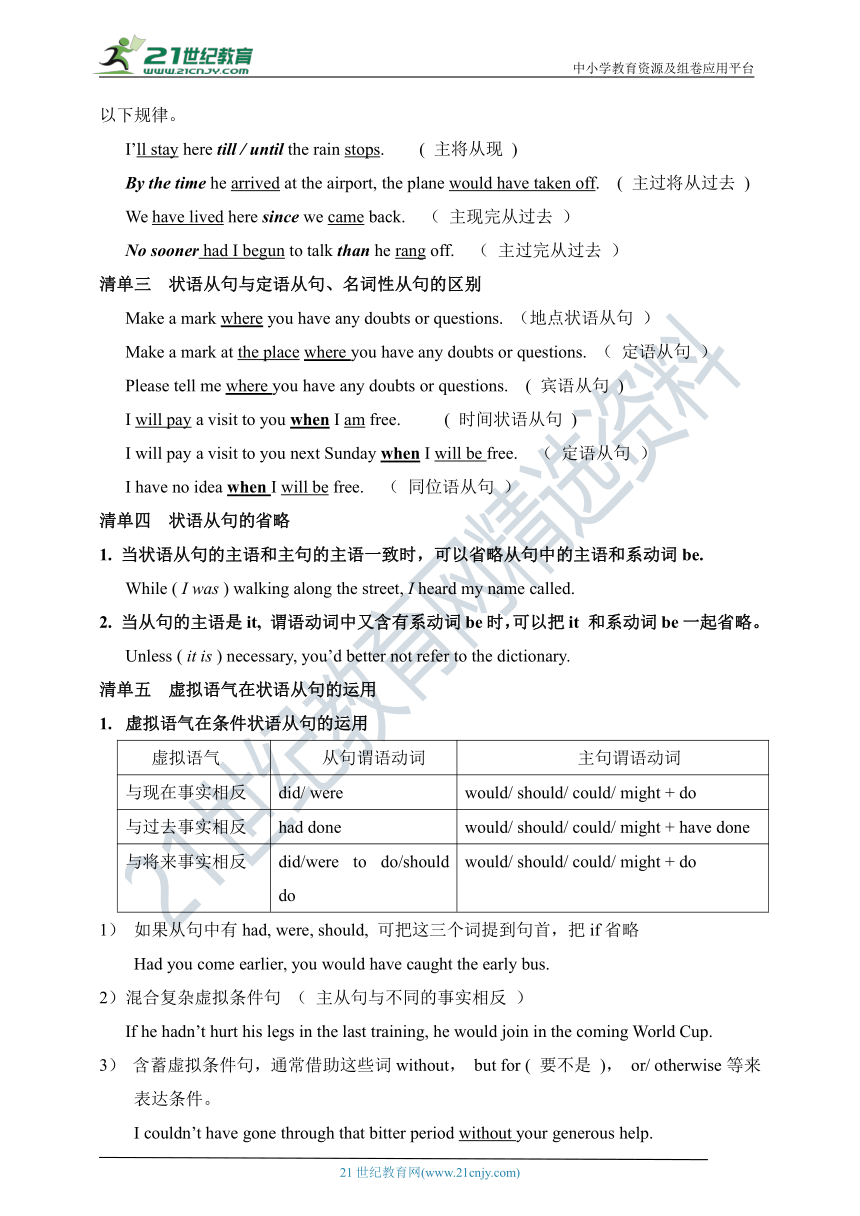【高考英语宝典】考前语法微专题七 状语从句(含答案)
文档属性
| 名称 | 【高考英语宝典】考前语法微专题七 状语从句(含答案) |  | |
| 格式 | doc | ||
| 文件大小 | 1.3MB | ||
| 资源类型 | 试卷 | ||
| 版本资源 | 通用版 | ||
| 科目 | 英语 | ||
| 更新时间 | 2022-05-05 19:23:32 | ||
图片预览




文档简介
语法微专题七----状语从句
清单一 状语从句分类
一.时间状语从句
1. when / as /while
1)when 意为“ 当---时候”,从句与主句的动作可以同时发生,也可以先后发生。从句谓语动词为延续性动词或非延续性动词。
We were having a meeting when someone broke in.
We had driven ten miles when the engine was out of order.
We were about to go out when it began to rain.
We were on the point of going out when it began to rain.
when还可表原因,意为“既然”,引导原因状语从句
It was foolish of you to take a taxi when you could easily walk there in five minutes.
2) as “ 当---时候;一边--- 一边---;随着”; 从句的动作与主句的动作同时发生,从句谓语一般为延续性动词
They talked as they walked along the river.
As you grow older, you’ll know better and better about your life.
3)while意为“ 当---时候”, 从句与主句的动作同时发生,强调一段时间,从句的谓语动词为延续性动词。
Please don’t talk so loud while others are working.
while作并列连词,意为“而,却”,表示对比
Father was preparing a report while I was playing PC games.
while还可表示“尽管”,引导让步状语从句。
While I understand what you say, I can’t agree with you.
2. until / till “ 直到--- ”
Not until school opened did I see him again. 倒装句
It was not until school opened that I saw him again. 强调句
3. since “自从---以来 ”
4. before “在---之前; 还没来得及;趁着没;才;就”
It will be + 一段时间 + before--- 多久之后才---.
It won’t be long before we meet again. (主将从现)
Before I could say something, he had left.
5. the first time every/each time next time 第一次--- 每次--- 下次---
by the time 到---为止
by the time 引导时间状语从句时,主句一般用将来完成时或过去完成时。
By the time he arrives at the airport, the plane will have taken off.
By the time he arrived at the airport, the plane had taken off.
6. as soon as the moment/ minute/ second immediately/ directly/ instantly 一 --- 就---
no sooner--- than--- hardly /scarcely/ rarely--- when--- 刚一---就---
No sooner had I begun to talk than he rang off. 我刚一开始说话他就挂断了。
Hardly had I told him my name when he stopped listening. 我刚一告诉他我的名字他就不听了。
7. once “ 一旦 ”, 含有条件意味。
Once you learn knowledge by heart, you’ll master it.
二.地点状语从句
Make a mark where you have any doubts or questions. ( 状语从句 )
Make a mark at the place where you have any doubts or questions. ( 定语从句 )
三.原因状语从句
because , as , for , since, now that, seeing that, given that, considering that “ 因为, 由于, 既然 ”
四.目的状语从句
in order that / so that / for fear that(惟恐,以防)/ in case ( 以防万一 )
so that / in order that 引导的状语从句中需用情态动词can, could等, 意为“以便,为了”
in order that 引导的从句可位于主句前或后,so that 引导的从句只能位于主句之后
五.结果状语从句
so / such --- that --- 如此---以致于---
so + adj + a/an + n. + that such + ( a/an ) + adj.+ n. + that
so/such置于句首,主句要部分倒装
So fast did he walk that none of us was his equal. 他走得如此快以致于我们谁也不是他的对手。
六.条件状语从句
if如果unless除非, 如果不as long as/ so long as/ on condition that只要in case 万一
七.让步状语从句
1. as “ 尽管”(一定倒装)
倒装前置的内容:表语形容词;表语名词去冠词;情态动词后动原;动词后副词
Young as she is, she has traveled to many countries.
Child as she is, she has learned many English words.
Much as I like it, I won’t buy it.
Try as he might, he could not find a job.
2. though “尽管 ” 可倒可不倒装, 可与yet, still, nevertheless连用,不可与but连用;可作副词, 单独置于句末, 意为“但是”。
Though she works very hard, (yet) she makes very slow progress.
I’ve a bit of cold. It is nothing much, though.
3. although / while “尽管” 不倒装
4. even though / even if “ 即使 ”
5. whether … or not “无论与否”
whether … or... “无论---还是---”
Whether you believe it or not, it is true.
6. whatever/ whoever/ whichever/ however/ whenever/ wherever = no matter what/ who/ which/ how/ when/ where “ 无论---, 不管--- ”
八. 比较状语从句
as ---as --- “和 --- 一样 ”
not as/ so --- as --- “和 --- 不一样 ”
than “ 比 ”
九. 方式状语从句
as “ 正如, 正像”
as if/ though “ 似乎,好像 ”
清单二 状语从句的时态归律
复合句中,主从句中时态一般要保持一致,但在时间、条件和让步三大状语从句遵循以下规律。
I’ll stay here till / until the rain stops. ( 主将从现 )
By the time he arrived at the airport, the plane would have taken off. ( 主过将从过去 )
We have lived here since we came back. ( 主现完从过去 )
No sooner had I begun to talk than he rang off. ( 主过完从过去 )
清单三 状语从句与定语从句、名词性从句的区别
Make a mark where you have any doubts or questions. (地点状语从句 )
Make a mark at the place where you have any doubts or questions. ( 定语从句 )
Please tell me where you have any doubts or questions. ( 宾语从句 )
I will pay a visit to you when I am free. ( 时间状语从句 )
I will pay a visit to you next Sunday when I will be free. ( 定语从句 )
I have no idea when I will be free. ( 同位语从句 )
清单四 状语从句的省略
1. 当状语从句的主语和主句的主语一致时,可以省略从句中的主语和系动词be.
While ( I was ) walking along the street, I heard my name called.
2. 当从句的主语是it, 谓语动词中又含有系动词be时,可以把it 和系动词be一起省略。
Unless ( it is ) necessary, you’d better not refer to the dictionary.
清单五 虚拟语气在状语从句的运用
虚拟语气在条件状语从句的运用
虚拟语气 从句谓语动词 主句谓语动词
与现在事实相反 did/ were would/ should/ could/ might + do
与过去事实相反 had done would/ should/ could/ might + have done
与将来事实相反 did/were to do/should do would/ should/ could/ might + do
1) 如果从句中有had, were, should, 可把这三个词提到句首,把if省略
Had you come earlier, you would have caught the early bus.
2)混合复杂虚拟条件句 ( 主从句与不同的事实相反 )
If he hadn’t hurt his legs in the last training, he would join in the coming World Cup.
3) 含蓄虚拟条件句,通常借助这些词without, but for ( 要不是 ), or/ otherwise等来表达条件。
I couldn’t have gone through that bitter period without your generous help.
We would have put John’s name on the race list yesterday but for his recent injury.
We lost our way in that small village, otherwise we would have visited more places of interest yesterday.
4)虚拟语气用于if only 引导的条件句或感叹句
If only I had known the news earlier! 要是我早知道这个消息就好了!
虚拟语气在方式状语从句的运用
I remember the whole thing as if it were yesterday.
典型题目
Tom is so independent that he never asks his parents’ opinion ________ he wants their support.
2. Why does Jack Ma still work so hard ________________ he has already owned so much money
3. ________________ she grew older, she became more beautiful.
4. Researchers have found that a baby’s cries can cause unique emotional responses in the brain, making it impossible for us to ignore them __________________ we are parents or not.
5. In fact, the discontent things are not useless since you may learn more from them _________________ from the things that cheer you up.
6. It will be two years _________________ China builds a space station.
7. You can keep all the files and documents __________________ you think it is convenient to get them.
8. In 2008, Japanese women set a record for life expectancy at 85.82 years, _________________ men live an average of 79.11 years.
9. Since there are other applicants on the line, we can’t let you know our decisions ______________ all of them have got their chances for interview.
10. It is five years ________________ I left my hometown.
11. Hunting elephants was so profitable _________________ from 1979 to 1989 the number of elephants in Africa fell from 1.3 million to 600,000.
12. No sooner had she got home __________________ it began to rain heavily.
13. It was not __________________ he took off his eyeglasses that I recognized him.
14. We will have a picnic tomorrow _______________ it rains or it’s very cold.
15. One Friday, we were packing to leave for a weekend away ________________ my daughter heard a cry for help.
16. How long do you think it will be _________________ the computer puts forward a new product
17. ___________________ I understand your viewpoint, I don’t agree with you.
18. The weather in London is ______________ changeable that people always take their umbrellas with them for fear ______________ it rains tomorrow.
19. But for your timely rescue, I _______________ ( lose ) my life.
20. The man who loses consciousness looks as if he ______________ ( be ) dead.
21. Other cultures may use silence in other ways, particularly when ______________ ( deal ) with conflicts among people or in relationships of people with different amounts of power.
22. If _____________ ( accept ) for the job, you’ll be informed soon.
23. If I had gone to the cinema, I would ________________ ( see ) the famous professor last night.
24. When ________________ ( compare ) different cultures, we often pay attention only to the differences without noticing many similarities.
25. I didn’t know his telephone number; otherwise, I would _____________________ ( inform ) him of the time.
答案:
unless
when
As
whether
than
before
where
while
until
since
that
than
until
whether
when
before
Although/Though
so; that
would have lost
were
dealing
accepted
have been
comparing
have informed
清单一 状语从句分类
一.时间状语从句
1. when / as /while
1)when 意为“ 当---时候”,从句与主句的动作可以同时发生,也可以先后发生。从句谓语动词为延续性动词或非延续性动词。
We were having a meeting when someone broke in.
We had driven ten miles when the engine was out of order.
We were about to go out when it began to rain.
We were on the point of going out when it began to rain.
when还可表原因,意为“既然”,引导原因状语从句
It was foolish of you to take a taxi when you could easily walk there in five minutes.
2) as “ 当---时候;一边--- 一边---;随着”; 从句的动作与主句的动作同时发生,从句谓语一般为延续性动词
They talked as they walked along the river.
As you grow older, you’ll know better and better about your life.
3)while意为“ 当---时候”, 从句与主句的动作同时发生,强调一段时间,从句的谓语动词为延续性动词。
Please don’t talk so loud while others are working.
while作并列连词,意为“而,却”,表示对比
Father was preparing a report while I was playing PC games.
while还可表示“尽管”,引导让步状语从句。
While I understand what you say, I can’t agree with you.
2. until / till “ 直到--- ”
Not until school opened did I see him again. 倒装句
It was not until school opened that I saw him again. 强调句
3. since “自从---以来 ”
4. before “在---之前; 还没来得及;趁着没;才;就”
It will be + 一段时间 + before--- 多久之后才---.
It won’t be long before we meet again. (主将从现)
Before I could say something, he had left.
5. the first time every/each time next time 第一次--- 每次--- 下次---
by the time 到---为止
by the time 引导时间状语从句时,主句一般用将来完成时或过去完成时。
By the time he arrives at the airport, the plane will have taken off.
By the time he arrived at the airport, the plane had taken off.
6. as soon as the moment/ minute/ second immediately/ directly/ instantly 一 --- 就---
no sooner--- than--- hardly /scarcely/ rarely--- when--- 刚一---就---
No sooner had I begun to talk than he rang off. 我刚一开始说话他就挂断了。
Hardly had I told him my name when he stopped listening. 我刚一告诉他我的名字他就不听了。
7. once “ 一旦 ”, 含有条件意味。
Once you learn knowledge by heart, you’ll master it.
二.地点状语从句
Make a mark where you have any doubts or questions. ( 状语从句 )
Make a mark at the place where you have any doubts or questions. ( 定语从句 )
三.原因状语从句
because , as , for , since, now that, seeing that, given that, considering that “ 因为, 由于, 既然 ”
四.目的状语从句
in order that / so that / for fear that(惟恐,以防)/ in case ( 以防万一 )
so that / in order that 引导的状语从句中需用情态动词can, could等, 意为“以便,为了”
in order that 引导的从句可位于主句前或后,so that 引导的从句只能位于主句之后
五.结果状语从句
so / such --- that --- 如此---以致于---
so + adj + a/an + n. + that such + ( a/an ) + adj.+ n. + that
so/such置于句首,主句要部分倒装
So fast did he walk that none of us was his equal. 他走得如此快以致于我们谁也不是他的对手。
六.条件状语从句
if如果unless除非, 如果不as long as/ so long as/ on condition that只要in case 万一
七.让步状语从句
1. as “ 尽管”(一定倒装)
倒装前置的内容:表语形容词;表语名词去冠词;情态动词后动原;动词后副词
Young as she is, she has traveled to many countries.
Child as she is, she has learned many English words.
Much as I like it, I won’t buy it.
Try as he might, he could not find a job.
2. though “尽管 ” 可倒可不倒装, 可与yet, still, nevertheless连用,不可与but连用;可作副词, 单独置于句末, 意为“但是”。
Though she works very hard, (yet) she makes very slow progress.
I’ve a bit of cold. It is nothing much, though.
3. although / while “尽管” 不倒装
4. even though / even if “ 即使 ”
5. whether … or not “无论与否”
whether … or... “无论---还是---”
Whether you believe it or not, it is true.
6. whatever/ whoever/ whichever/ however/ whenever/ wherever = no matter what/ who/ which/ how/ when/ where “ 无论---, 不管--- ”
八. 比较状语从句
as ---as --- “和 --- 一样 ”
not as/ so --- as --- “和 --- 不一样 ”
than “ 比 ”
九. 方式状语从句
as “ 正如, 正像”
as if/ though “ 似乎,好像 ”
清单二 状语从句的时态归律
复合句中,主从句中时态一般要保持一致,但在时间、条件和让步三大状语从句遵循以下规律。
I’ll stay here till / until the rain stops. ( 主将从现 )
By the time he arrived at the airport, the plane would have taken off. ( 主过将从过去 )
We have lived here since we came back. ( 主现完从过去 )
No sooner had I begun to talk than he rang off. ( 主过完从过去 )
清单三 状语从句与定语从句、名词性从句的区别
Make a mark where you have any doubts or questions. (地点状语从句 )
Make a mark at the place where you have any doubts or questions. ( 定语从句 )
Please tell me where you have any doubts or questions. ( 宾语从句 )
I will pay a visit to you when I am free. ( 时间状语从句 )
I will pay a visit to you next Sunday when I will be free. ( 定语从句 )
I have no idea when I will be free. ( 同位语从句 )
清单四 状语从句的省略
1. 当状语从句的主语和主句的主语一致时,可以省略从句中的主语和系动词be.
While ( I was ) walking along the street, I heard my name called.
2. 当从句的主语是it, 谓语动词中又含有系动词be时,可以把it 和系动词be一起省略。
Unless ( it is ) necessary, you’d better not refer to the dictionary.
清单五 虚拟语气在状语从句的运用
虚拟语气在条件状语从句的运用
虚拟语气 从句谓语动词 主句谓语动词
与现在事实相反 did/ were would/ should/ could/ might + do
与过去事实相反 had done would/ should/ could/ might + have done
与将来事实相反 did/were to do/should do would/ should/ could/ might + do
1) 如果从句中有had, were, should, 可把这三个词提到句首,把if省略
Had you come earlier, you would have caught the early bus.
2)混合复杂虚拟条件句 ( 主从句与不同的事实相反 )
If he hadn’t hurt his legs in the last training, he would join in the coming World Cup.
3) 含蓄虚拟条件句,通常借助这些词without, but for ( 要不是 ), or/ otherwise等来表达条件。
I couldn’t have gone through that bitter period without your generous help.
We would have put John’s name on the race list yesterday but for his recent injury.
We lost our way in that small village, otherwise we would have visited more places of interest yesterday.
4)虚拟语气用于if only 引导的条件句或感叹句
If only I had known the news earlier! 要是我早知道这个消息就好了!
虚拟语气在方式状语从句的运用
I remember the whole thing as if it were yesterday.
典型题目
Tom is so independent that he never asks his parents’ opinion ________ he wants their support.
2. Why does Jack Ma still work so hard ________________ he has already owned so much money
3. ________________ she grew older, she became more beautiful.
4. Researchers have found that a baby’s cries can cause unique emotional responses in the brain, making it impossible for us to ignore them __________________ we are parents or not.
5. In fact, the discontent things are not useless since you may learn more from them _________________ from the things that cheer you up.
6. It will be two years _________________ China builds a space station.
7. You can keep all the files and documents __________________ you think it is convenient to get them.
8. In 2008, Japanese women set a record for life expectancy at 85.82 years, _________________ men live an average of 79.11 years.
9. Since there are other applicants on the line, we can’t let you know our decisions ______________ all of them have got their chances for interview.
10. It is five years ________________ I left my hometown.
11. Hunting elephants was so profitable _________________ from 1979 to 1989 the number of elephants in Africa fell from 1.3 million to 600,000.
12. No sooner had she got home __________________ it began to rain heavily.
13. It was not __________________ he took off his eyeglasses that I recognized him.
14. We will have a picnic tomorrow _______________ it rains or it’s very cold.
15. One Friday, we were packing to leave for a weekend away ________________ my daughter heard a cry for help.
16. How long do you think it will be _________________ the computer puts forward a new product
17. ___________________ I understand your viewpoint, I don’t agree with you.
18. The weather in London is ______________ changeable that people always take their umbrellas with them for fear ______________ it rains tomorrow.
19. But for your timely rescue, I _______________ ( lose ) my life.
20. The man who loses consciousness looks as if he ______________ ( be ) dead.
21. Other cultures may use silence in other ways, particularly when ______________ ( deal ) with conflicts among people or in relationships of people with different amounts of power.
22. If _____________ ( accept ) for the job, you’ll be informed soon.
23. If I had gone to the cinema, I would ________________ ( see ) the famous professor last night.
24. When ________________ ( compare ) different cultures, we often pay attention only to the differences without noticing many similarities.
25. I didn’t know his telephone number; otherwise, I would _____________________ ( inform ) him of the time.
答案:
unless
when
As
whether
than
before
where
while
until
since
that
than
until
whether
when
before
Although/Though
so; that
would have lost
were
dealing
accepted
have been
comparing
have informed
同课章节目录
